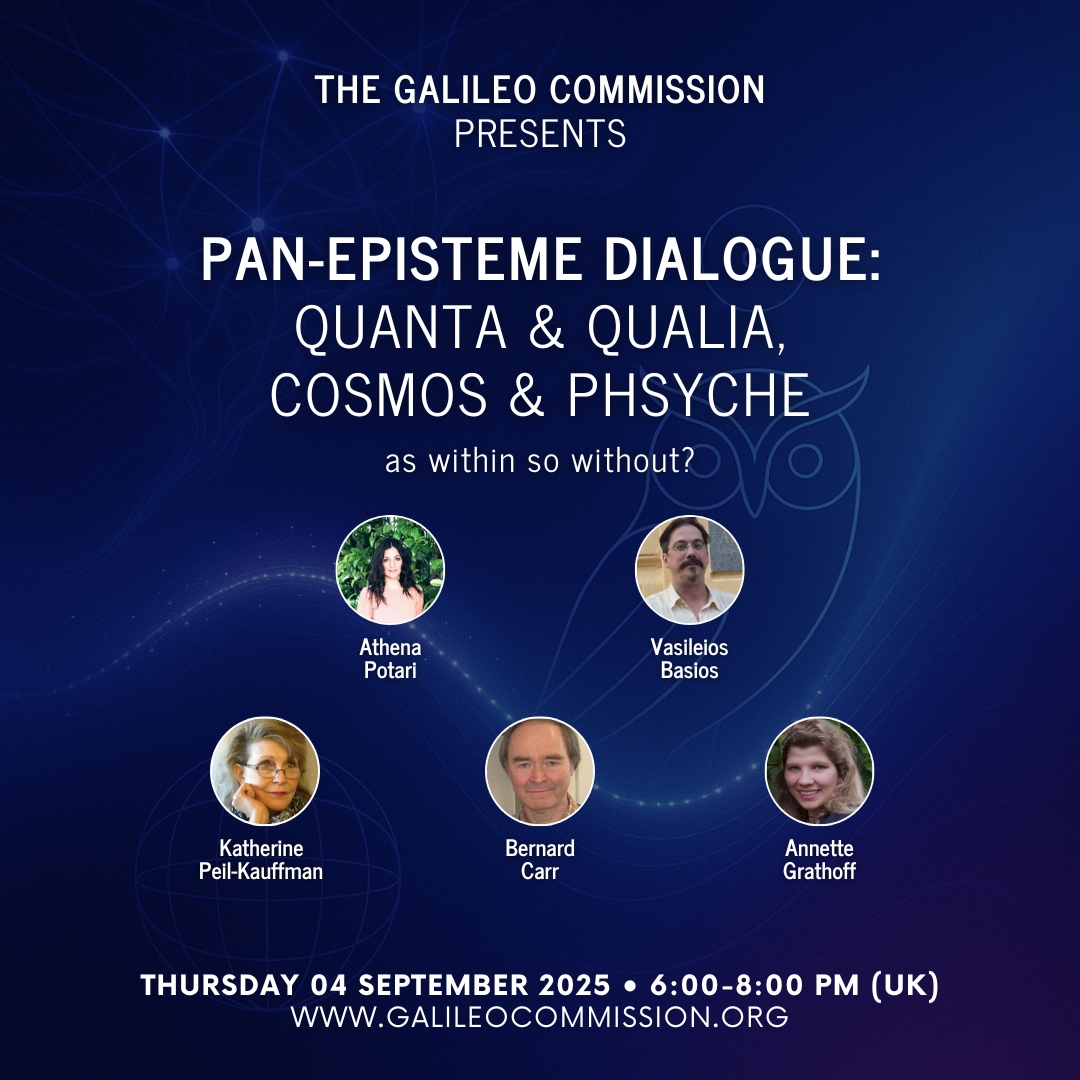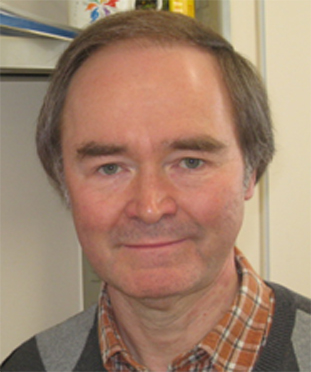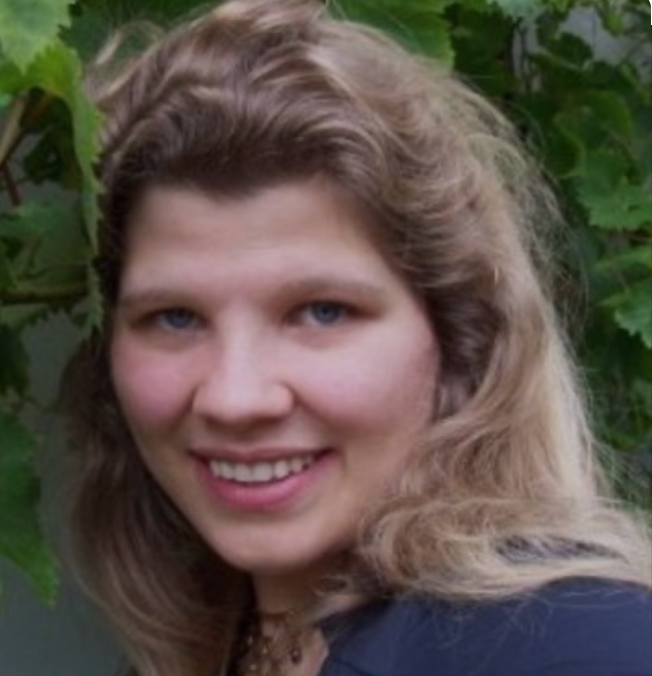Event Recording
Event Description

‘Pan-Episteme’ is a term derived from the Greek, combining ‘Pan’ meaning all, the one, the universal, and ‘Episteme’ meaning knowledge, science and understanding. It signifies a holistic, integrative approach to knowledge that transcends disciplinary boundaries, bringing together insights from science, philosophy and ancient wisdom traditions.
This time Dr Athena Potari (a practical philosopher) & Dr Vasileios Basios (a theoretical physicist) examine the perennial questions on Psyche and Cosmos as it resonates in today’s scientific debates on Qualia and the Quantum.
From ancient times to our present day, one of the most fundamental questions of human thought concerns the origin and properties of the cosmos: how does the world come into existence? What are its fundamental dimensions and qualities?
However, during the past two centuries, the mainstream academic investigations around the topic have primarily focused on the material dimension of the universe and its creation; sciences, like physics, cosmology, even philosophy, for the most part, have limited their cosmological exploration almost exclusively to a materialist perspective: we are looking for “first particles”, material sources of cosmological origin, digging into the nucleus and sub-atomic mystery of matter with the hopes of discovering a first point of origin – an ultimate material, quantifiable originating point. And yet, our studies have almost entirely left out a most crucial aspect of the universe – one that ancient and non-western worldviews, appear to have grasped with greater clarity, finesse, and discernment: our very conscious experience; i.e. the conscious, intelligent, subtler, qualitative aspect of the Universe. What the Ancient Greek tradition called ‘the Soul of the Universe” (which, according to Plato’s Timaeus – indeed precedes the creation of the “Universes’ body”).
In earlier cosmologies, we encounter a plethora of extremely elaborate, rigorous explications of the “origin of the Nous” and the “birth of the Soul” of the cosmos. Further to the study of matter, thinkers study the intangible principles, powers, laws – i.e. the structure of both the material and the immaterial fabric of existence, and their intricate, life-creative, interweaving. The recent post-materialist paradigm shift in our scientific communities, is bringing the question of “cosmos and psyche” back into the forefront of discussions.
In science, qualia and quanta tackle the big questions of reality, consciousness, and experience. Despite their common Latin root “qua” meaning “what” or “how”, these concepts are strikingly different yet fundamentally linked. Qualia are the “what it is like” aspects of conscious experience. Qualities, like emotions, pleasure, pain and intention. Fleeting like Psyche, qualia resist objectification and are the core of the “hard problem of consciousness”. Quanta are the minimal units of physical properties in quantum theory. This concept developed by Max Planck became fundamental to our quantifying of matter, energy and the Cosmos.
We unite scholars, scientists and wisdom keepers in a reflective dialogue on this ancient, yet still exceptionally relevant topic. Our aim is to combine scientific and philosophical insight to deepen our understanding of consciousness and cosmology from novel perspectives.

Dr Katherine Peil-Kauffman is the Founding Director of EFS International, an organisation dedicated to fostering global emotional wisdom. A pioneering interdisciplinary researcher with degrees from the University of Washington and Harvard Divinity School, she has revolutionised our understanding of the biological function of emotion. She identified emotion as an innate “self-regulatory sense”: an evaluative perceptual mechanism through which living systems participate in evolutionary processes.
Her groundbreaking work bridges clinical psychology, spirituality, neuroscience and complexity theory, and proposes that emotions serve as an intrinsically innate guidance system essential for optimal health, moral development and spiritual experience. She has delivered talks internationally on the evolution of emotions, their physio-chemical nature, and their role in human development and non-violence. Her theoretical framework challenges traditional concepts of ‘good and evil’, offering a biophysically informed vision of naturalistic spirituality. Currently married to theoretical biologist Stuart Kauffman, she continues to advance emotional science through her writing and lectures, as well as her comprehensive model which integrates emotion with consciousness, values and human flourishing: https://www.emotionalsentience.com/

Prof. Bernard Carr is Emeritus Professor of Mathematics and Astronomy at Queen Mary University of London. He studied with Stephen Hawking at Cambridge University and Caltech. He then held Research Fellowships at Cambridge before moving to Queen Mary in 1985. He was also visiting professor in USA, Canada and Japan. His area of research is cosmology and astrophysics, the early universe, black holes, dark matter and the anthropic principle. He is the author of around 300 papers and the books Universe or Multiverse? and Quantum Black Holes. He is very interested in the role of consciousness, regarding this as a fundamental rather than incidental feature of the Universe, and he is developing a new physical paradigm, which accommodates normal, paranormal and mystical experiences. He also has a long-standing interest in the relationship between science and religion and views psychical research as forming a bridge between them. He is President of the Scientific & Medical Network and former President of the Society for Psychical Research.

Dr Annette Grathoff is a distinguished interdisciplinary researcher specialising in biology and chemical ecology. She earned her PhD in Biology from Carl von Ossietzky University in Oldenburg; with additional training in Chemistry, Physics, Ecology and Information Theory, and treating the function of information as a theoretical superstructure. She is an active member of several international research communities, focusing on the evolution of information processing systems. She is managing a literature review project investigating stability in evolutionary processes. Her academic work is multidisciplinary, including research on Systems, Information, and Ethics of Information. She is publishing extensively, recently on nonlinear frequency mixing, information theory applications, and the explicit function of life in physical systems. She is one of the founding members of the Galileo Commission’s ‘oREGano’ working group. In 2023, her team was awarded the Linda G. O’Bryant Noetic Sciences Research Prize for their work on detecting non-local consciousness correlates beyond the brain during the dying process and in collective ritual-related synchronicities.